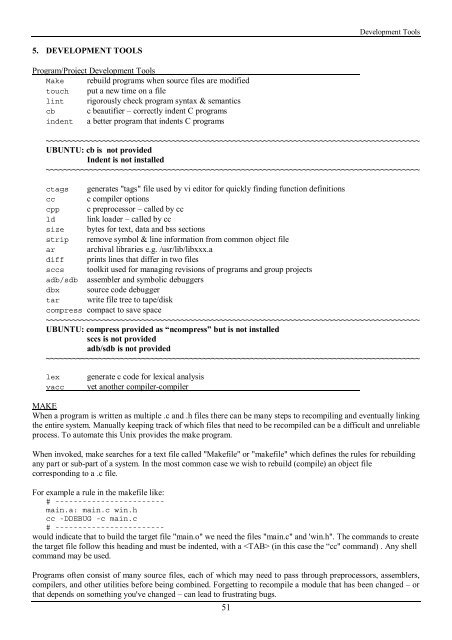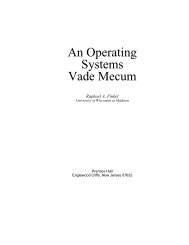Create successful ePaper yourself
Turn your PDF publications into a flip-book with our unique Google optimized e-Paper software.
Development Tools<br />
5. DEVELOPMENT TOOLS<br />
Program/Project Development Tools<br />
Make rebuild programs when source files are modified<br />
touch put a new time on a file<br />
lint rigorously check program syntax & semantics<br />
cb c beautifier – correctly indent C programs<br />
indent a better program that indents C programs<br />
~~~~~~~~~~~~~~~~~~~~~~~~~~~~~~~~~~~~~~~~~~~~~~~~~~~~~~~~~~~~~~~~~~~~~~~~~~~~~~~~~~~~~~<br />
UBUNTU: cb is not provided<br />
Indent is not installed<br />
~~~~~~~~~~~~~~~~~~~~~~~~~~~~~~~~~~~~~~~~~~~~~~~~~~~~~~~~~~~~~~~~~~~~~~~~~~~~~~~~~~~~~~<br />
ctags generates "tags" file used by vi editor for quickly finding function definitions<br />
cc c compiler options<br />
cpp c preprocessor – called by cc<br />
ld link loader – called by cc<br />
size bytes for text, data and bss sections<br />
strip remove symbol & line information from common object file<br />
ar archival libraries e.g. /usr/lib/libxxx.a<br />
diff prints lines that differ in two files<br />
sccs toolkit used for managing revisions of programs and group projects<br />
adb/sdb assembler and symbolic debuggers<br />
dbx source code debugger<br />
tar write file tree to tape/disk<br />
compress compact to save space<br />
~~~~~~~~~~~~~~~~~~~~~~~~~~~~~~~~~~~~~~~~~~~~~~~~~~~~~~~~~~~~~~~~~~~~~~~~~~~~~~~~~~~~~~<br />
UBUNTU: compress provided as “ncompress” but is not installed<br />
sccs is not provided<br />
adb/sdb is not provided<br />
~~~~~~~~~~~~~~~~~~~~~~~~~~~~~~~~~~~~~~~~~~~~~~~~~~~~~~~~~~~~~~~~~~~~~~~~~~~~~~~~~~~~~~<br />
lex<br />
yacc<br />
generate c code for lexical analysis<br />
yet ano<strong>the</strong>r compiler-compiler<br />
MAKE<br />
When a program is written as multiple .c and .h files <strong>the</strong>re can be many steps to recompiling and eventually linking<br />
<strong>the</strong> entire system. Manually keeping track of which files that need to be recompiled can be a difficult and unreliable<br />
process. To automate this <strong>Unix</strong> provides <strong>the</strong> make program.<br />
When invoked, make searches for a text file called "Makefile" or "makefile" which defines <strong>the</strong> rules for rebuilding<br />
any part or sub-part of a system. In <strong>the</strong> most common case we wish to rebuild (compile) an object file<br />
corresponding to a .c file.<br />
For example a rule in <strong>the</strong> makefile like:<br />
# ------------------------<br />
main.a: main.c win.h<br />
cc -DDEBUG -c main.c<br />
# ------------------------<br />
would indicate that to build <strong>the</strong> target file "main.o" we need <strong>the</strong> files "main.c" and 'win.h". The commands to create<br />
<strong>the</strong> target file follow this heading and must be indented, <strong>with</strong> a (in this case <strong>the</strong> “cc" command) . Any shell<br />
command may be used.<br />
Programs often consist of many source files, each of which may need to pass through preprocessors, assemblers,<br />
compilers, and o<strong>the</strong>r utilities before being combined. Forgetting to recompile a module that has been changed – or<br />
that depends on something you've changed – can lead to frustrating bugs.<br />
51
















